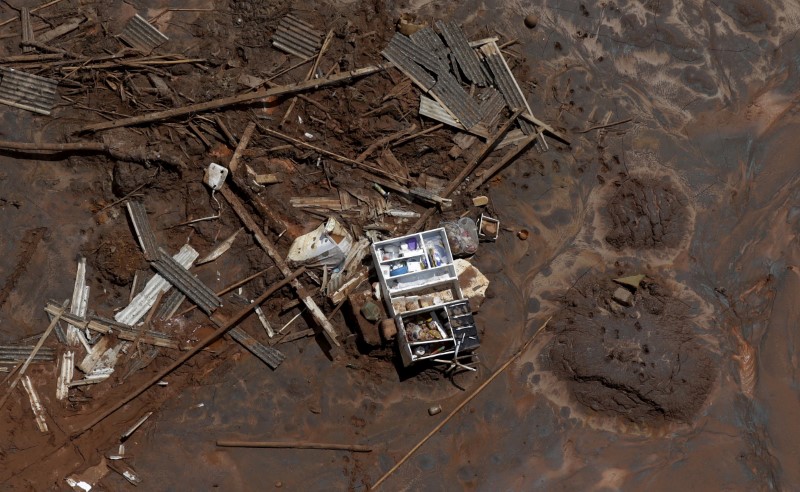By Claire Milhench
LONDON (Reuters) - For years, the Brazilian mining conglomerate Vale was a darling of emerging market investors, who were happy to ignore the company's poor record on environmental and social issues because of the high yields its bonds paid.
But warnings about the company's policies were horribly vindicated in 2015, when a dam holding back waste at its Samarco mine burst, killing 19 people in Brazil's worst-ever environmental disaster.
Prices on Vale and Samarco bonds plummeted by about a third after the disaster. Vale, along with mine co-owner BHP Billiton (LON:BLT), is facing a multi-billion dollar claim.
Events like that are increasingly spurring fund managers to look closer at environmental, social and governance (ESG) risks before investing in emerging markets, where polluting industries and accounting issues have often gone unpunished.
This is especially so in dollar debt markets, where the temptation of a lucrative income stream via high-interest bond coupons has often proved too strong to resist.
But recent months have seen more frequent governance-driven sell offs - from "accounting irregularities" at South African retailer Steinhoff to bribery and food safety investigations at Brazilian meatpacker JBS.
In January, investors who bought Mozambique's 10.5 percent "tuna bond" learned the country would default. Bond proceeds, earmarked for a tuna fishing fleet, had vanished.
Vale was a vindication of sorts for Sergey Dergachev, senior portfolio manager at Union Investment. Vale had been on the "fail" list for most of Union's ESG funds for about six years because of its environmental and social governance record.
"When Samarco happened, it was a confirmation for us that we had identified this issue properly," Dergachev said.
"ESG mandates tend to lag a bit in risk-on environments, but in risk-off scenarios they tend to do better," he said, referring to investors' willingness to look past problems when they are flush with cash.
That might be why fund managers have been happy to buy bonds this year from the likes of Tajikistan or Saudi Arabia. But demand for ethical investment is growing - over half of the $265 billion of institutional money invested in emerging debt is now run with ESG considerations, according to research firm eVestment.
And the number should grow as sovereign wealth funds join in. This month a group of funds, including from Norway's and Saudi Arabia's, pledged to develop an ESG framework to address climate change; some of them are already divesting from fossil fuels.
This suggests the worst offenders - whether on the environmental or political front - will face a dwindling pool of investors willing to buy their bonds, putting pressure on those that fail to clean up their act.
"As investors become increasingly ESG-minded, a company that isn't making any efforts in terms of ESG will have fewer investors willing to lend them money, so longer term, their cost of funding will increase," said Karine Jesiolowski, senior investment specialist for EM debt at Swiss asset manager UBP.
LEADERS AND LAGGARDS
In equities, there is good evidence that ethical investors reap higher returns over the longer term.
Index provider MSCI's Emerging Markets ESG Leaders Index, which comprises shares in companies with high ESG scores relative to sector peers, has outperformed the main emerging equity index by an annualized 4.1 percent since inception in September 2007.
Now there are signs that debt markets are pricing ESG risk. A recent research paper by Steffen Hoerter, global head of ESG at Allianz (DE:ALVG) Global Investors, found better ESG scores reflected in lower sovereign debt insurance costs.
But applying ethical metrics to emerging debt is tricky. The prevalence of natural-resources companies, repressive regimes and corruption means a simple exclusion-based approach may not work.
As a result, some managers, such as UBP, are adopting a "leaders and laggards" strategy, investing in best in class companies that also meet other key investment criteria.
Others, such as BNP Paribas (PA:BNPP) Asset Management, also don't exclude most issuers outright but use ESG criteria to assess whether they are being paid to take the risk.
"If we think the alpha proposition is very high, we will take a position, but it will be much less than we would have done if the ESG score had been more favorable," said Bryan Carter, head of emerging market fixed income.
But they tend to stay out of markets with rock-bottom ESG scores, such as Angola, Iraq, Mongolia and Belarus.
"It's very intuitive to think of the lowest-scoring ESG countries as places to stay away from, as they are more likely to suffer debt distress or a credit event," Carter added.
Not everyone is convinced that using ESG criteria can help generate excess returns for debt investors. This year's list of top-performing emerging bond markets is peppered with countries such as Poland and Russia, where leaders are tightening their grip on power.
"We have seen some predictive power (for ESG) on the equity side, but we haven't seen the same level of detail on the credit side," said Steve Williams, a senior portfolio manager at Nikko Asset Management. "We need to go through a full credit cycle."
The ease with which some frontier markets have issued debt this year suggests that short-term investment horizons, higher yields and the perceived predictability of autocratic regimes will keep some investors coming back for more.
But if ethical investing is not yet a must, the direction of travel is clear, says Roy Scheepe, senior client portfolio manager at NN Investment Partners, which incorporates ESG components into its investment process.

"There is always a group with very high standards, and that has helped raise the minimum level for all," he said. "The bar is higher than it was five to 10 years ago, and I expect that to continue."